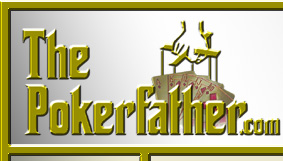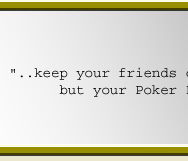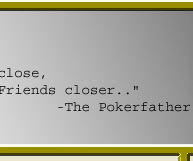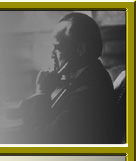(Click Here for the Latest Online Poker News Stories)
Copyright © 2006 CBS News
HEADLINE:
Playing Poker For Charity
Body:
Recently I traveled to Annapolis, Md., to compete against 140
players in a charity fundraising tournament. The first prize was
a seat in the $10,000 championship event at the World Series of
Poker in July. The tournament was designed to raise money for
Access Information, Inc., an organization that provides online
and published information about facilities and services which
are accessible to people with disabilities.
Charity tournaments are structured quite differently from standard
tournaments. Their objective is to raise as much money as possible
for the sponsoring charity. All the entry fees paid by the players
go to the charity. The prizes for which the players compete are
all donated. In this tournament the second, third and fourth place
prizes were gift certificates from Best Buy in the amount of $3,000,
$2,000 and $1,000 respectively.
The initial entry fee was $150, for which each player was given
1,000 tournament chips. Unlike a typical tournament, however,
if you lost your chips during the first three hours you were not
eliminated – you had the option of buying another 1,000
tournament chips for $100. And you could “rebuy” as
many times as you wanted during the first three hours of play.
The only limitation was that you could only rebuy when your stack
went below T-500 ($500 of tournament chips). Then, at the end
of the three hour “rebuy” period, every player had
the option of buying another T-2,000 for another $100 fee, regardless
of how many chips you had at that point.
This raises a lot of money for charity, but it calls for a radical
adjustment in strategy. Because no player is risking elimination
from the tournament during the rebuy period, players are prepared
to gamble more – they tend to play more hands (hence weaker
hands) and to play them more aggressively. Very few players are
eliminated during the rebuy period – only those who lose
all their chips and who do not want to invest any more money in
the tournament.
After the rebuy period ends, things settle down and the “real
tournament” begins. From that point forward if you lose
all your chips you are out, so the action tends to slow down.
The players were mostly folks from the Delmarva area, of all
sizes and shapes and ages and colors. I was assigned to the same
table as last year’s winner, Steve Crawford. It quickly
became apparent that he was an experienced tournament player.
He played aggressively, he played well, and worst of all (for
me) he was really “running good” as they say. During
the first five hours of the tournament he turned over two aces
twice, two kings twice, two queens and two jacks once each, an
ace and a king twice and an ace and a queen once. Most telling
of all, all those hands held up and won big pots.
In contrast, I never picked up a single premium pair. I was dealt
an ace and a king once and won a nice pot with it, but otherwise
I had to depend on playing aggressively in favorable position
and forcing people to lay down their hands, in order to stay alive
as long as I did.
The tournament got off on a bizarre foot when the director announced
that the first three players who went “all in” and
got called would get a free buy-in if they lost. I suggested to
the players at my table that four of us should immediately go
all in as soon as the cards were dealt. One guy would quadruple
his stack, and the others would get their chips replenished for
free! Well, they all looked at me like I was crazy.
So the cards were dealt, and one player moved all in (with what
turned out to be two 10s). I was dealt A-2 of spades, and I quickly
said “I call”, figuring that if I won I would double
up and if I lost I would get a free new supply of chips. Everyone
else folded. Then the dealer informed us that three other tables
had moved faster than us, and I was the fourth player to call
an all in bet, so our table would not be eligible for the freebie
extended to the first three all-in players who got called! I asked
if I could change my mind in that case, but the director ruled
against me and said I was bound by my verbal “call”
of the all-in bet.
The dealer turned over the three card flop: A-J-2, giving me
two pair. My opponent (whose bet I would not have called had I
been told it was too late to get in on the freebie) needed one
of the two remaining tens in order to overtake me. Luckily for
me fourth and fifth street did not help him, and I doubled up
(accidentally) on the first hand of the tournament! My hapless
opponent had to fork over $100 to rebuy.
During the course of the next hour I won moderate pots with A-7,
Q-5, and A-3. I won a good sized pot with A-K when a player with
K-J moved all in after a king came on the flop. I lost a sizeable
pot when I flopped two pair with A-4, moved all in, got called
by a woman who had a flush draw, and lost when she made her flush
on the river. When all was said and done, I ended up with T-3425
at the end of the first hour.
During the next hour I won with a king of hearts and a 9 of hearts
(I made a flush), J-9 (two pair), a king of hearts and a 7 of
hearts (everyone folded when I raised before the flop), and 9-7
of clubs (flopped a flush, beat an all in player who had the ace
of clubs and was hoping for another club). I lost a big pot when
I flopped top pair with K-10 and lost on the river to an all in
player who made a straight. At the end of the second hour I was
holding steady at T-3225.
Early in the third hour I ran into a disaster. Holding K-J in
the small blind, I flopped a pair of jacks. Steve Crawford, last
year’s winner and the chip leader at our table, had 9-9.
He caught a third nine on fourth street, played his hand skillfully,
and got all my chips. Rebuy!
With less than an hour to go in the rebuy period, I was forced
to gamble in an effort to accumulate chips. I was dealt the A-10
of diamonds in late position. An early position player raised,
and I re-raised all in. He called and turned over K-K, but I got
lucky. The flop came K-Q-9, all diamonds. I flopped the nut flush.
But he flopped three kings, and could still win if the board paired
(which would give him a full house). Happily for me that did not
happen and I doubled my small stack. Then I won a decent pot with
the 10-9 of clubs when I flopped top pair and bet it aggressively.
At the end of the rebuy period I had run my new T-1,000 stack
up to about T-3700. With the additional T-2000 “add-on”
chips, I started the “real tournament” after the rebuy
period with T-5700. The chip leader at my table had a bit more
than T-8,000, so I felt I had enough chips to be competitive if
the cards would cooperate.
When play resumed play tightened up dramatically, as you would
predict now that losing a big pot could mean elimination. One
of the secret weapons employed by professional tournament players
is to play aggressively when the table is tight, and play tight
when the table is loose. You make the most money when you are
able to play counter to the strategy of the rest of the table.
(Like most of the pros’ secrets, this strategy is now accessible
to all of us thanks to the plethora of poker books published by
the top pros and teachers of the game.)
I still was not able to pick up any premium hands, but by betting
hands like K-J and A-10 aggressively in late position, I was able
to move my chip count up to T-9500. If you keep pushing marginal
hands, eventually you are going to run into a better hand and
get trapped for a lot of chips. That finally happened when I bet
8-8 aggressively against a player holding A-K. Unfortunately for
me, he spiked an ace and I lost a bunch of chips. I never won
another pot. With the blinds escalating every 20 minutes, I made
a move with K-J and ran into the chip leader’s J-J. I was
unable to catch a king, and shortly before the dinner break I
was eliminated.
It never feels good to bust out of a tournament you hope to win,
but this time at least I could feel good about having contributed
to a good cause.
Anyone who needs information on disability-accessible facilities
and services can find help at www.disabilityguide.org.
Exclusive Noble
Poker Bonus: 50% up to $250
Article
downloaded from the World Wide Web on April 23, 2006:
http://www.cbsnews.com/stories/2006/03/20/
entertainment/main1420826_page2.shtml |
(Click Here for the Latest Online Poker News Stories)
|







